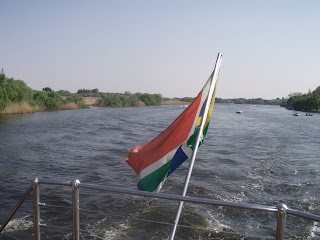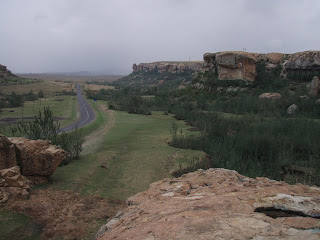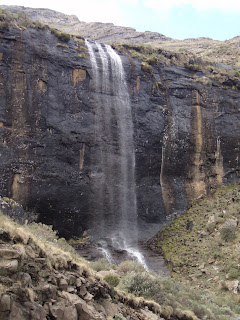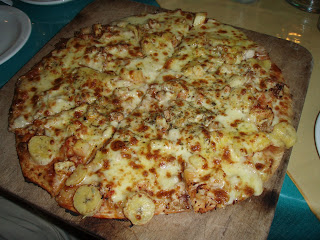Many of you are not aware that I spent some time before I left South Africa in Cape Town visiting friends of mine who are living there. I was really excited to get a chance to see the Mother City again, as it was one of my favorite places to visit in South Africa, and I had only one goal for the week--to see the city from the top of Table Mountain. For those of you who are not South Africa officionados by now (I can't imagine, but I'll indulge you nonetheless), Table Mountain is iconic in South Africa. EVERYONE knows what it is, where it is, and what it looks like. If you go to Cape Town, it is imperative that you travel up the mountain to see the vista that awaits. This is why it seemed criminal to me that I had visited Cape Town thrice and never seen the city from the mountain. Just so that you can get an idea of the role of the mountain in the life of Capetonians, here's a picture:

As you can tell, anywhere you are in the city, you can see the mountain. So, obviously, I had to go up the mountain. I told my friend Elliot that I wanted to go, no matter what else we did in the week, and he agreed, but suggested that we not take the cableway since it's expensive and he had done it multiple times during the year. So we decided to make the climb up the mountain. We would then look around the top, take the necessary tourist photos, and then ascend via the cableway. Our friend Emily would pick us up at the bottom and ferry us back to the flat in order to get ready for a night at the theater.
We knew it would take us 3-4 hours to reach the summit, and so we started off, snacks and Energade (think Gatorade) in hand...backpack. We had brought jackets with us because the guidebooks all warn about the possible winds on the top of the mountain. We began hiking around 1pm, and it was a beautiful day. Probably 80 degrees Fahrenheit and sunny. Perfect for hiking. So we set off up Skeleton Gorge, which is a relatively strenuous climb, but nothing too dangerous. It is really a lovely ascent and we were enjoying it to the full.
As we reached the first plateau, it began to get cloudy. Now, I was none too pleased about this development, but we kept on the sunny side (if you will) and suggested that it would likely blow over when we reached the top, allowing us to have a wonderful view, but not get too hot while reaching the top. Since there was no longer tree cover, we were happy to have a few clouds.
The clouds didn't clear, though. In fact, as we hiked across the top of the mountain, it got cloudier, and windier, and foggier, and colder. Scroll back up to that picture for a moment. Do you see how long the flat part of the mountain is? We started somewhere on the right...and hiked all the way to the left. In the fog, not sure of how far we still had to go. About an hour was the answer. All the time, the weather is getting worse and worse. At some point on that trek, Elliot says, "I don't want to be the bearer of bad news, but I doubt that they're running the cable car. It's getting way too windy." I chose to ignore that one, as my thighs were asking me not to climb down the mountain as well.
At this point, I began to be really grateful for the mittens sitting in my pocket. Like a good mom, my mother always made me keep mittens in my pocket--and I still do! Never so grateful in my life. As we continued walking, Elliot was cold, but I was freezing. So, I was really, really happy when we reached the paved area, and I knew that we were near the cableway station. As we neared the "inhabited" area, we realized that it was not inhabited at all. In fact, it was a ghost town. Complete with wispy clouds swirling about your head. The restrooms were locked, the restaurant deserted and the cableway station completely empty.
Plan B: Call Elliot's friend who knows the mountain well and inquire as to what is the best choice for our descent--on foot. He suggested that we hike down the front of the mountain. Thepath began at the same point as did the path we walked in on, so we should be able to find it easily. It should be stated at this point that it is so windy by now that my body is moving without my volition and that is NOT fun for me. And I am still freezing. And so is Elliot at this point, so I know it's genuinely cold. We return to where we walked in...and we can only see about nine feet in front of us...and we can't find the trail...the one we JUST walked in on. In order to keep from walking off of a precipice, we turn around and head back to the cableway station. At the station, I had observed a pay phone with the number for mountain rescue, and we decide that we are now at the point that mountain rescue is a necessary addition to our adventure.
So while I use the restroom (the natural one--remember that the actual restroom is locked, so imagine how cold I am at this moment), Elliot calls mountain rescue. The conversation goes something like this:
"Hello. My name is Elliot. I hiked up Table Mountain earlier today, back when it was a nice day. Now we're at the top of the mountain and it's not so nice and the cable car isn't running, so we need some advice on what to do."
"Are you lost?"
"No, I know exactly where I am--I'm at the payphone at the cableway station at the top of the mountain, but I need to know what to do now."
"Table Mountain....Cape Town! Please hold."
So while I'm huddled nearby shivering uncontrollably, Elliot is on hold listening to a recording in all 11 of the national languages playing on a loop. Eventually, another guy gets on the line, asks for our cell phone numbers, asks our ages, how we came up the mountain, and what supplies we have with us, then tells us that he will call us back with a plan. Meanwhile, we find an alcove in the building where we can huddle together and keep a little more warm. Keep in mind, we are in shorts, windbreakers, and I have mittens. Otherwise, we're pretty exposed, and by now I would guess that it's around 40 degrees Fahrenheit on the top of the mountain. We agree that if the phone hasn't rung in 10 minutes, we'll call back. After nine minutes, my phone rings.
"Hello."
"Hi, I am calling back because I hear you're stuck on the top of the mountain."
"Yes sir," I respond, puzzled at how campy and chatty this guy is.
"Ok, I need you to take down some numbers. Do you have a pen and paper?"
"Um, NO."
"Ok, well, you need to remember these numbers."
"No problem. Elliot, take down these numbers on your phone." Elliot attempts to take down the numbers, but is unable to move his frozen fingers fast enough to unlock his phone. He's useless, so I ask the guy what the numbers are for. Turns out they're for the code to the men's toilet. So, I walk there (slowly due to the gale force winds) and put the code into the lock and open the door. A rush of warm air overcomes us. Now the man is giving me a code to the cupboard in the room. I open the closet and there are blankets, a kettle, and supplies to make coffee! Score! I tell him thank you and he says:
"Ok, the first cablecar will be down in the morning, and we'll see you then."
"Are you kidding?!"
"Nope. Can I get your names?"
At this point, the phone cuts out. Elliot and I laugh and begin to prepare for a night in the mens toilet. Supplies: eight blankets, four small and four large, plenty of coffee, two bags of almonds, four Energades, and one bag of dried mangoes. We are now regretting the choice to leave Newsweek in the car. Activities: 20 questions, which I actually hate due to long car rides with my family in which my six-year-old brother would insist on playing unlimited questions. Seriously. Apparently, I'm also not that good at choosing 20 questions, nor guessing. Whatever. Discussing our theses. Planning our lives for the next year. Freezing.
Remember how I said it was warm earlier? Apparently that was just because we were so cold. Those of you who know me well, also know that I am extremely cold natured. So being that cold is BAD in my book. The only time that I'm warm the entire night is when Elliot is sleeping with his head on my feet. That's also almost the only time that I can sleep. We don't sleep much. I think that goes without saying. An important detail in the coldness factor is that Elliot is convinced that at some point during the night it will clear and we will be able to go outside and see the sunset, the stars, or the sunrise as the only people on Table Mountain. I am not so hopeful. But because of his hopes, Elliot is led to open the door, letting in a rush of cold air, every hour on the hour. This is closely followed by his quick retreat back to the "comforts" of the mens toilet and the bubbling of the kettle to make more warm drinks. He's a silly kid.
We do finally get a little sleep from 5-7am. When we awaken at 7, Elliot emerges from the restroom to see if he can get cell phone reception and to check out the cableway station. Sure enough, the top of the mountain is still abandoned. Elliot does get reception, though, and calls back the mountain rescue guy. He cheerfully responds and Elliot asks if he should be concerned that the first cablecar is posted to leave at 7am and it is now 7:30 and still deserted. Mountain rescue guy promises to call back momentarily with an answer to that query.
He calls back directly to inform Elliot that there is good news and bad news. The bad news is that the cablecar isn't running because the wind is still too high. The good news is that they think they can run it for a rescue mission! He instructs us to remain in the restroom and someone will be up to get us shortly. We procede to have a breakfast of almonds and mango slices and not twenty minutes later, we hear a lovely sound: a knock on the door of the toilet! Our saviors, two mountain rescue guys in the flesh, are here to ferry us down the mountain to warmth! And so while they regale us with stories of daring, dashing mountain rescues, I strain to see the view, and Elliot calls Emily to request a pick-up, we descend on the cableway, free of charge!
When we finally reach the ground, it is as if our experience on the top of the mountain was a dream. It is a warm, sunny day in Cape Town. Emily later tells us that it has been the entire time we were on the mountain, though it was quite windy during the night. And once we returned to the flat, had showers, and a bit of a nap, it began to seem more and more like a dream. Thank goodness!
Total time spent in the men's toilet on the top of Table Mountain: 14 hours.
 A real Southern breakfast! They loved the grits and hash browns!
A real Southern breakfast! They loved the grits and hash browns!


 The Vaal River and the South African flag
The Vaal River and the South African flag















 Statue of Samora Machel, a Mozambican liberation leader.
Statue of Samora Machel, a Mozambican liberation leader.
 Kristian reading on the deck of the backpackers
Kristian reading on the deck of the backpackers



 Views of Maputo. Now imagine the chicken!
Views of Maputo. Now imagine the chicken!











 We sat and chatted with some friendly, witty Brits, and then headed to bed to prepare for the long journey in the morning through Swaziland to Mozambique.
We sat and chatted with some friendly, witty Brits, and then headed to bed to prepare for the long journey in the morning through Swaziland to Mozambique.







